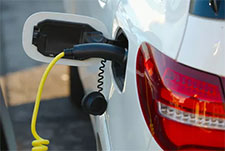**New Legislation
For the third time in past seven (7) years, the California Legislature has modified the laws governing the installation and use of Electric Vehicle (EV) charging stations within homeowners associations (“HOAs”). The first time was in 2011 when the Legislature enacted a new statute (now contained at Civil Code Section 4745) designed to nullify any provision in a HOA’s governing documents that prohibited homeowners from installing and using EV charging stations. In the following year, the Legislature then amended the law to give HOAs some regulatory authority in this area. That amendment served two (2) essential purposes: (1) it gave HOAs the ability to impose “reasonable restrictions” on the installation and use of EV charging stations, and (2) it clarified how the statute is primarily intended to apply to EV charging stations to be installed in a homeowner’s exclusive use/dedicated parking space.
This year (2018), SB 1016 was proposed by the Legislature. It makes some significant changes to Section 4745, and also adds new Section 4745.1 to the Civil Code to address EV Charging Station dedicated “TOU” (time of use) meters. Today, September 14, 2018, the Governor signed SB 1016 and its changes to the law will take effect January 1, 2019. The following information summarizes what HOAs should be aware of in the wake of SB 1016’s passage.
Changes to Existing Section 4745, effective January 1, 2019:
- Section 4745(a) was amended to expand the scope of rights homeowners have to install EV charging stations. Homeowners will now have the right to install EV charging stations in their “units,” not simply their designated, exclusive use common area parking spaces. Some condominium developments are structured such that each “unit” is comprised of a residential element and a garage element. Other developments actually include spaces within the deeds to the individual units. Thus, regardless of whether a homeowner’s designated parking space is within their unit’s garage, or within a portion of common area, the provisions of Section 4745 apply.
- Section 4745(f)(1)(D) was amended to clarify that the homeowner has to pay for not only the electricity usage associated with the charging station, but also for the costs of installation of the station.
- Section 4745(f)(3) was amended to relax the insurance requirements of homeowners who install EV charging stations. The $1,000,000 homeowner liability coverage policy requirement has now been replaced with a requirement for the homeowner to simply have “a liability coverage policy” without any specific amount listed. The requirement for the HOA to be named as an additional insured under the policy has also been deleted. **However, somehow the requirement under 4745(f)(1)(C) for the homeowner to, as a condition of approval, agree to provide a certificate of insurance which names the HOA as an additional insured has not been changed. In other words, the law now contradicts itself. Another “head-scratcher” from the California Legislature that should prompt a clean-up bill next year (we hope).
- Section 4745(k) has been amended in a way that materially modifies the remedies available in enforcing Section 4745’s requirements. Prior to SB 1016, Section 4745(k) allowed for a prevailing plaintiff in an action to enforce Section 4745 to recover its attorney’s fees. The new law will change this language to allow recovery of attorney’s fees only when “a homeowner requesting to have an [EV] charging station installed and seeking to enforce compliance with [Section 4745]” is the prevailing plaintiff. In other words, regardless of whether the HOA is the plaintiff or the defendant, it will never be able to recover attorney’s fees in a lawsuit to enforce Section 4745 even where the HOA wins! This is the latest example of the Legislature’s willingness to modify the fee-shifting provisions of the Davis-Stirling Act to afford homeowners an advantage over their HOAs.
New Section 4745.1, effective January 1, 2019:
As referenced above, new Section 4745.1 will be added to the Civil Code effective January 1, 2019. It basically mirrors the provisions of Section 4745 (pertaining to EV Charging Station installations) in order to extend them to EV-dedicated “TOU” (time of use) meters. An EV-dedicated TOU meter is an electric meter supplied and installed by an electric utility, that is (a) separate from, and in addition to, any other electric meter, (b) is devoted exclusively to the charging of EVs, and (c) that tracks the time of use (TOU) when charging occurs. It is designed to aid utility companies in determining what price per kilowatt-hour should be charged for the use of an EV charging station at specific times of day.
Applications for the installation and use of EV-dedicated TOU meters must be processed in virtually the same way as applications for the installation and use of charging stations, except that the insurance requirements which apply to charging stations do not apply to EV-dedicated TOU meters. Section 4745.1 also requires HOAs to “attempt to find a reasonable way to accommodate” a request to install an EV-dedicated TOU meter, “unless the [HOA] would need to incur an expense.”
| SB 1016 is the latest example of the Legislature’s continuing trend of promoting renewable energy technologies and limiting the regulatory authority of HOAs. In our prior blog posts and newsletters on EV charging stations, we have touched on the need of every HOA (especially condominium HOAs) to work with its HOA lawyer to implement rules designed to process homeowner requests for EV charging stations in ways that comport with statutory requirements. That need is even greater now. HOAs that violate Section 4745 and/or new Section 4745.1 are subject to civil penalties and damages. |
 HOA Lawyer Blog
HOA Lawyer Blog

